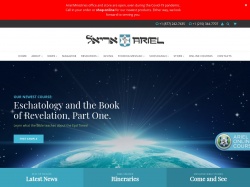When Tamar’s pregnancy advanced to the point where she could no longer conceal it, “she would tap upon her stomach and boast, ‘I am big with kings and redeemers!’” (Midrash Rabbah). At the very least, she was big with twins.
While Tamar struggled in labor, the first of her two sons extended his hand. The midwife tied a scarlet string around his wrist to identify the firstborn, but he then retracted his hand and apparently retreated back down the birth canal—a stunt that does not seem biologically probable. Tamar gave birth to his brother before him in a traumatic labor. She named him Perez (Peretz, פרץ), which means “breach,” saying, “What a breach you have made for yourself” (Genesis 38:29).
That Perez pushed ahead was part of the Divine plan. Zerah desired to emerge first but God declared: “Messiah is destined to descend from Perez; is it right, then, that Zerah should emerge first? Let Zerah return to his mother’s womb, and Perez shall be born first!” (Aggadat Bereshit)
The rabbis closely identified Perez, the son of Judah and Tamar, with King Messiah. Perez heads the genealogy of David in Ruth 4:18. The sages sometimes call Messiah by the name Son of Perez. The twins in Tamar’s womb portend the two messiahs: Messiah son of Joseph and Messiah son of David. That is to say, the birth of Perez and Zerah signify the first and second coming of Yeshua.
Perez, whose name also means “breaker,” represents Messiah in His first coming. He broke open the way into the kingdom of heaven. Tamar named him Perez to indicate that King Messiah, “the Breaker,” would one day come forth from him:
Tamar meant, “This one is greater than all those who make breaches, for from you will arise the King Messiah [of whom it is written in Micah 2:13], ‘The breach-maker goes up before them; they break out, pass through the gate and go out by it. So their king goes on before them, and the LORD at their head.’” (Genesis Rabbah 85:14)
Zerah (Zerach, זרח), whose name means “dawning,” represents Messiah son of David, i.e. Yeshua in His second coming. The prophet Isaiah spoke of the great redemption of the Messianic Era as the dawning:
Arise, shine; for your light has come, and the glory of the LORD has risen (zarach) upon you. For behold, darkness will cover the earth and deep darkness the peoples; but the LORD will rise upon you and His glory will appear upon you. Nations will come to your light, and kings to the brightness of your rising (zarach). (Isaiah 60:1-3)
Just as Tamar and her midwife expected Zerah to be born first, we anticipated the final redemption to occur with the first coming of Messiah. For a brief moment, the kingdom of heaven was at hand, and if the nation had repented, Yeshua could have brought us to the final redemption. Like a thread of scarlet, we did receive a token of the coming redemption, but before the final redemption could dawn, the Messiah needed to accomplish His purposes on the cross and in the grave.
When Perez defied Tamar’s expectation by bursting forth ahead of Zerah, she exclaimed, “What a breach you have made for yourself!” (Genesis 38:29). Similarly, Yeshua’s first coming defied popular expectation. Rather than filling the triumphant role of Messiah son of David, He endured the suffering of Messiah son of Joseph. As He unexpectedly burst forth from the tomb, Israel might be imagined to exclaim, “What a breach you have made for yourself!”
Vayeshev – וישב : “And he dwelt”
Torah : Genesis 37:1-40:23
Haftarah : Amos 2:6-3:8
Gospel : John 2:13-4:42
Source: Torah Portion



